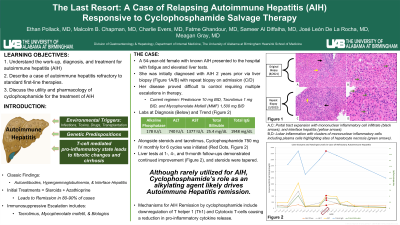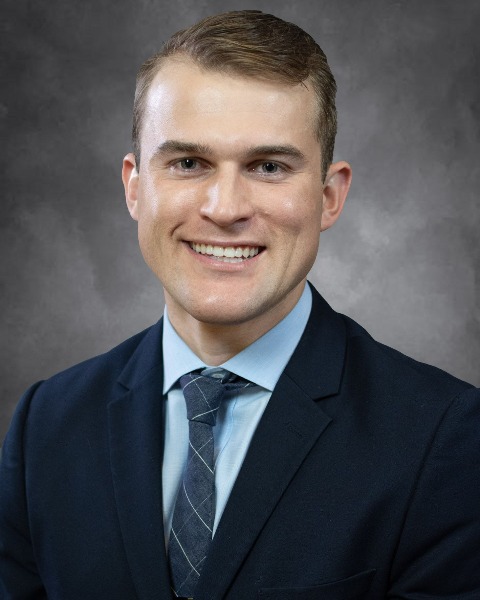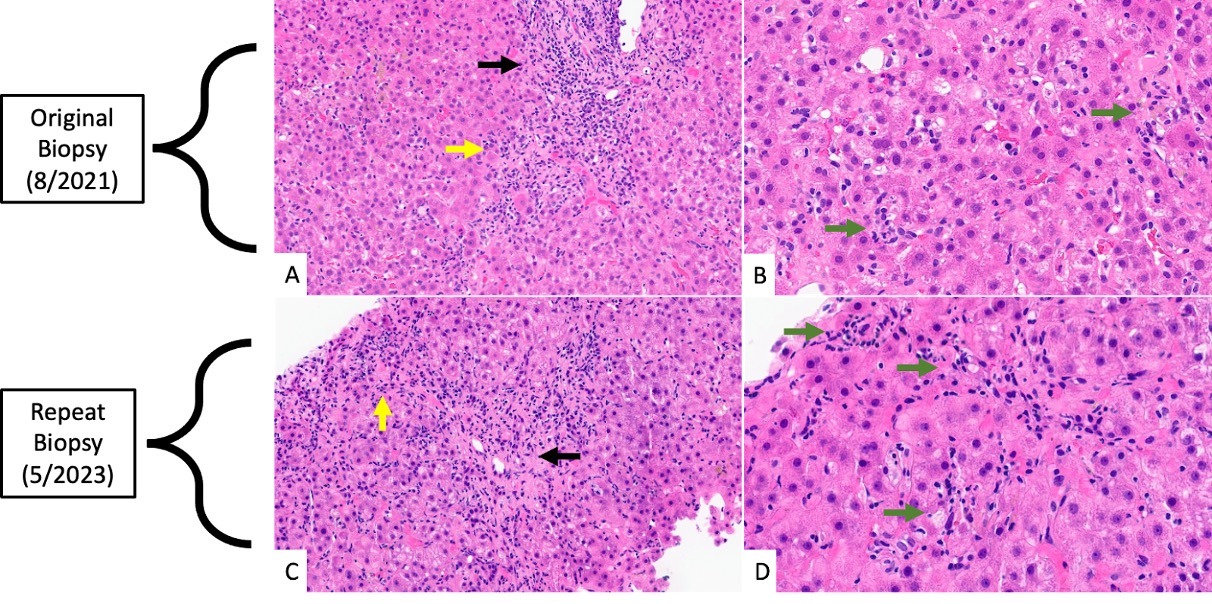Sunday Poster Session
Category: Liver
P1424 - The Last Resort: A Case of Relapsing Autoimmune Hepatitis Responsive to Cyclophosphamide Salvage Therapy
Sunday, October 27, 2024
3:30 PM - 7:00 PM ET
Location: Exhibit Hall E

Has Audio

Ethan D. Pollack, MS, MD
University of Alabama at Birmingham Heersink School of Medicine
Birmingham, AL
Presenting Author(s)
Ethan D. Pollack, MS, MD1, Malcolm B. Chapman, MBA, MD1, José León De La Rocha, MD, FACR1, Meagan Gray, MD2, Fatme Ghandour, MD1, Sameer Al Diffalha, MD1
1University of Alabama at Birmingham Heersink School of Medicine, Birmingham, AL; 2The University of Alabama at Birmingham Heersink School of Medicine, Birmingham, AL
Introduction: Management of autoimmune hepatitis (AIH) is challenging for patients who either fail to respond or experience adverse effects with first line therapies. Existing literature is limited and demonstrates variable efficacy for salvage therapies. Here, we present a case of refractory AIH with sustained response to cyclophosphamide.
Case Description/Methods: A 54-year-old female with history of systemic lupus erythematosus on hydroxychloroquine and previously diagnosed AIH on mycophenolate mofetil, tacrolimus, and prednisone presented to the hospital due to worsening fatigue and rising liver tests. She was initially diagnosed with AIH two years prior with positive serologies (anti-smooth muscle antibody 1:160; immunoglobulin G 1948 mg/dL) and classic liver biopsy findings (Figure 1A/B). She had severe, refractory disease and had previously been treated with azathioprine and rituximab, in addition to the off label use of belimumab. Despite aggressive therapy, her liver tests continued to rise leading to her admission (Table 1). On arrival, her vital signs and physical exam were unremarkable. An extensive laboratory evaluation revealed total bilirubin 3.9 mg/dL, AST 480, ALT 207, alkaline phosphatase 199, and INR 1.38. Her total IgG was 2,178, and she tested negative for infectious etiologies (CMV, EBV, HIV, HBV, HCV, HAV). A repeat liver biopsy showed portal and lobular inflammation with severe interface activity and clusters of plasma cells highlighting sites of hepatocyte necrosis (Figure 1C/D), consistent with active AIH. The patient was treated with methylprednisolone for two days before initiating cyclophosphamide. She remained on stable doses of oral prednisone and tacrolimus, and her mycophenolate mofetil was replaced with 6-mercaptopurine. She completed an additional 5 cycles of cyclophosphamide at a dose of 1000mg per infusion. Follow-up at 1, 4, and 9 months demonstrated normalization of liver tests with gradual resolution of fatigue and her prednisone was able to be tapered (Table 1).
Discussion: Cyclophosphamide for refractory AIH has not been previously described. Here we present a case of refractory AIH achieving remission following 6 cycles of cyclophosphamide therapy. At lower doses, cyclophosphamide’s role as an alkylating agent may drive AIH remission via downregulation of Th1 and cytotoxic T-cells leading to a reduction in pro-inflammatory cytokine release. Further evaluation into the role of cyclophosphamide for refractory AIH should be investigated.

Note: The table for this abstract can be viewed in the ePoster Gallery section of the ACG 2024 ePoster Site or in The American Journal of Gastroenterology's abstract supplement issue, both of which will be available starting October 27, 2024.
Disclosures:
Ethan D. Pollack, MS, MD1, Malcolm B. Chapman, MBA, MD1, José León De La Rocha, MD, FACR1, Meagan Gray, MD2, Fatme Ghandour, MD1, Sameer Al Diffalha, MD1. P1424 - The Last Resort: A Case of Relapsing Autoimmune Hepatitis Responsive to Cyclophosphamide Salvage Therapy, ACG 2024 Annual Scientific Meeting Abstracts. Philadelphia, PA: American College of Gastroenterology.
1University of Alabama at Birmingham Heersink School of Medicine, Birmingham, AL; 2The University of Alabama at Birmingham Heersink School of Medicine, Birmingham, AL
Introduction: Management of autoimmune hepatitis (AIH) is challenging for patients who either fail to respond or experience adverse effects with first line therapies. Existing literature is limited and demonstrates variable efficacy for salvage therapies. Here, we present a case of refractory AIH with sustained response to cyclophosphamide.
Case Description/Methods: A 54-year-old female with history of systemic lupus erythematosus on hydroxychloroquine and previously diagnosed AIH on mycophenolate mofetil, tacrolimus, and prednisone presented to the hospital due to worsening fatigue and rising liver tests. She was initially diagnosed with AIH two years prior with positive serologies (anti-smooth muscle antibody 1:160; immunoglobulin G 1948 mg/dL) and classic liver biopsy findings (Figure 1A/B). She had severe, refractory disease and had previously been treated with azathioprine and rituximab, in addition to the off label use of belimumab. Despite aggressive therapy, her liver tests continued to rise leading to her admission (Table 1). On arrival, her vital signs and physical exam were unremarkable. An extensive laboratory evaluation revealed total bilirubin 3.9 mg/dL, AST 480, ALT 207, alkaline phosphatase 199, and INR 1.38. Her total IgG was 2,178, and she tested negative for infectious etiologies (CMV, EBV, HIV, HBV, HCV, HAV). A repeat liver biopsy showed portal and lobular inflammation with severe interface activity and clusters of plasma cells highlighting sites of hepatocyte necrosis (Figure 1C/D), consistent with active AIH. The patient was treated with methylprednisolone for two days before initiating cyclophosphamide. She remained on stable doses of oral prednisone and tacrolimus, and her mycophenolate mofetil was replaced with 6-mercaptopurine. She completed an additional 5 cycles of cyclophosphamide at a dose of 1000mg per infusion. Follow-up at 1, 4, and 9 months demonstrated normalization of liver tests with gradual resolution of fatigue and her prednisone was able to be tapered (Table 1).
Discussion: Cyclophosphamide for refractory AIH has not been previously described. Here we present a case of refractory AIH achieving remission following 6 cycles of cyclophosphamide therapy. At lower doses, cyclophosphamide’s role as an alkylating agent may drive AIH remission via downregulation of Th1 and cytotoxic T-cells leading to a reduction in pro-inflammatory cytokine release. Further evaluation into the role of cyclophosphamide for refractory AIH should be investigated.

Figure: Figure 1:
A,C: Portal tract expansion with mononuclear inflammatory cell infiltrate (black arrows), and interface hepatitis (yellow arrows).
B,D: Lobular inflammation with clusters of mononuclear inflammatory cells including plasma cells highlighting sites of hepatocyte necrosis (green arrows).
A,C: Portal tract expansion with mononuclear inflammatory cell infiltrate (black arrows), and interface hepatitis (yellow arrows).
B,D: Lobular inflammation with clusters of mononuclear inflammatory cells including plasma cells highlighting sites of hepatocyte necrosis (green arrows).
Note: The table for this abstract can be viewed in the ePoster Gallery section of the ACG 2024 ePoster Site or in The American Journal of Gastroenterology's abstract supplement issue, both of which will be available starting October 27, 2024.
Disclosures:
Ethan Pollack indicated no relevant financial relationships.
Malcolm Chapman indicated no relevant financial relationships.
José León De La Rocha indicated no relevant financial relationships.
Meagan Gray: Novo Nordisk – Consultant.
Fatme Ghandour indicated no relevant financial relationships.
Sameer Al Diffalha indicated no relevant financial relationships.
Ethan D. Pollack, MS, MD1, Malcolm B. Chapman, MBA, MD1, José León De La Rocha, MD, FACR1, Meagan Gray, MD2, Fatme Ghandour, MD1, Sameer Al Diffalha, MD1. P1424 - The Last Resort: A Case of Relapsing Autoimmune Hepatitis Responsive to Cyclophosphamide Salvage Therapy, ACG 2024 Annual Scientific Meeting Abstracts. Philadelphia, PA: American College of Gastroenterology.
